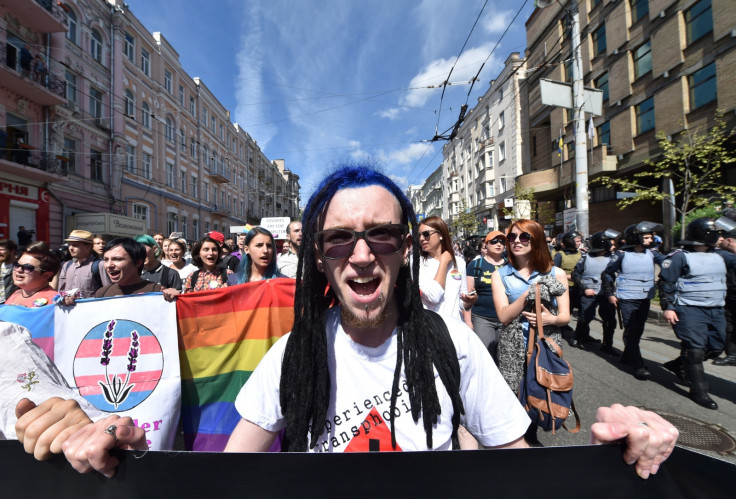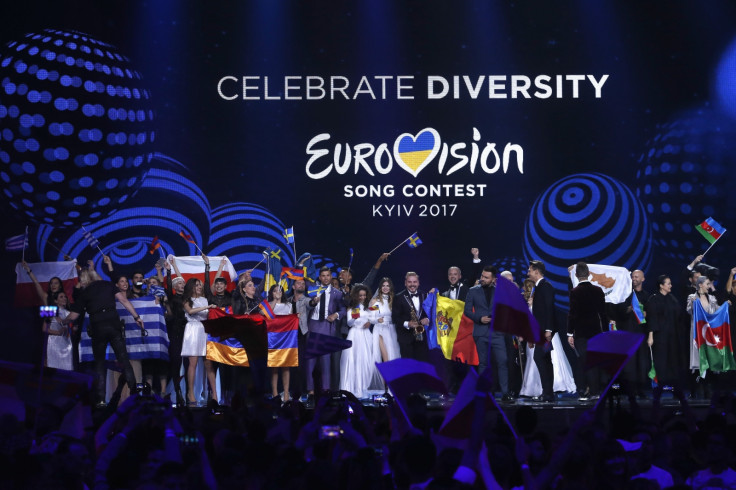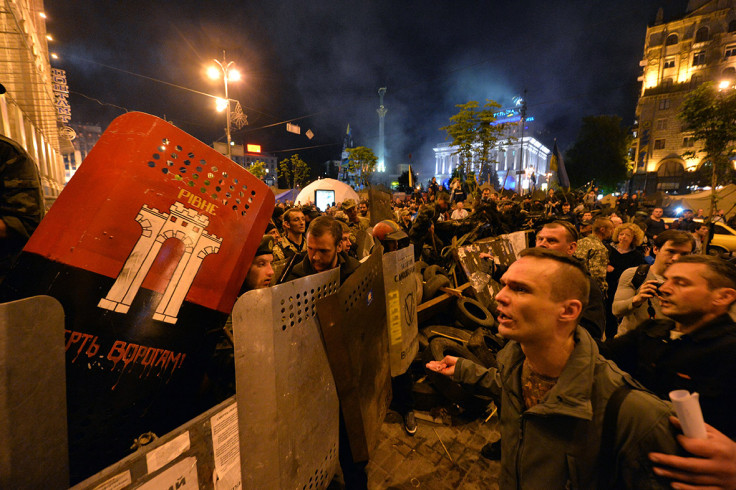Eurovision and LGBT rights: 'Homophobia in Ukraine runs deep'
Anti-LGBT discrimination is rife in the country hosting this year's contest.

Loud and proud, Eurovision has always been a celebration of LGBT culture. While Conchita Wurst's stunning victory in 2014 may be the first performance that comes to mind, the contest has a long history of embracing lesbian, gay, bisexual and transgender visibility.
Ten years ago, Paul Oscar became the first openly gay contestant to perform at Eurovision, with his performance causing controversy among conservative viewers. A year later, Israel's Dana International became the first trans person to win the competition.
Contestants regularly ignore the competition's "no politics" policy to make a stand on LGBT rights. In 2013, Finland's Krista Siegfrids performed a song in favour of gay marriage that featured a lesbian kiss. A year later, when Vladimir Putin signed his country's anti-gay bill into law, Russia's entry was booed on stage.
This year, Ukraine will host Eurovision with the motto "Celebrate Diversity". Compared to neighbouring Russia, where homophobia is institutionalised and gay Chechen men are being detained in prison camps, Ukraine's record on LGBT rights seems gleaming.
But Ukrainian activists say this is not the case.
"Queer Ukrainians like me are not equal under the law," says Ukrainian journalist and LGBT activist Maxim Eristavi. "There's no justice available for us, no hate speech or hate crimes laws protecting us. Violence and discrimination are systemic, with just a few people who can afford to be publicly out in a country of 40 million."

Ukraine became the first post-Soviet country to decriminalise homosexuality after the fall of the Iron Curtain in 1991. But intolerance has steadily grown – mirroring the rising homophobia in neighbouring Russia.
After Ukraine's bloody Euromaidan Revolution in 2014, there was hope among LGBT Ukrainians that the new pro-European government would embrace and enshrine their civil rights. Lenin monuments were toppled and activists smashed Kiev's Independence Square, signifying an end to the country's Soviet past. But to this day, it has failed to deal with a major part of its history: homophobia.
Ukraine has recently introduced legislation protecting the LGBT community, including banning sexual discrimination in employment in 2015. But anti-LGBT sentiment remains high among the public and officials – and discrimination and abuse is rife.
"Homophobia in Ukraine is deep and entrenched as well, but unlike in Russia, it is not a state policy and takes roots in lack of education about queer issues," Eristavi says. "In the last couple of years we had a couple of major breakthroughs for the equality movement: the first ever violence-free gay pride in Kiev, the first ever regional gay pride in Odessa, anti-discrimination laws protecting LGBT at workplaces – all done with help of foreign allies."
But, he adds, progress is moderate. "Many transnational religious and conservative groups pour a lot of resources to Ukraine and other Eastern European countries in an attempt to transform them into 'safe havens' of homophobia."
Alisa Pyvovarchyk, of the organisation Gay Alliance Ukraine, says abuse and discrimination are still rife. In the last ten days, the group received reports of five cases of violence against LGBT people in different regions of Ukraine.

"There is a noticeable increase in the number of cases, when gay people have been asked out on a date on gay dating websites and then they've been attacked by group of men," she says. "These groups usually shoot movies of their assaults and publish them on their websites or on social media."
Eristavi says the issue of LGBT rights is entangled in a wider standoff between the liberal world and Russia – and that Ukraine is at the frontline. Ahead of the competition, Kiev transformed a Soviet-era monument into a rainbow to trumpet the country's willingness to accept diversity. It has received a mixed reaction, with far-right groups claiming the move is "gay propaganda".
Whether Eurovision will help improve acceptance remains to be seen.
"Remembering Eurovision in Russia of 2009 or Azerbaijan in 2012, I don't believe that hosting the event can have any effect on local civil rights battles," Eristavi says. "The Ukrainian government failed spectacularly to channel the motto 'Celebrate Diversity' into real action. In the end, the only diversity that was celebrated during the event was the diversity of white, straight, body abled, cis-gender males."
Despite this, LGBT activist Zoryan Kis remains positive that times are changing for the better – and that the capital's rainbow monument is a metaphor for growing acceptance. Kis understands more than anyone that Ukraine faces a challenge when it comes to LGBT rights. Two years ago, he and his boyfriend were pepper-sprayed by teenagers in the centre of Kiev.
"It basically shows that diversity is not fully achieved in Ukraine, but that we are almost there," he told Euractiv - adding that LGBT fans visiting Kiev should still be cautious about public displays of affection.
–
© Copyright IBTimes 2025. All rights reserved.






















